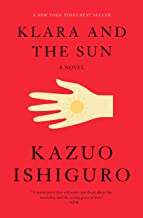Klara and the Sun by Kazuo Ishiguro 2021
This is the eighth novel by this Nobel Prize-winning writer, and it’s another strange one. Hard to fathom that the writer of ‘The Remains of the Day’, one of my favorite contemporary novels, also wrote this futuristic, dystopian sci-fi novel.
The story-line is fairly straight-forward, but Ishiguro is the master of omission and hints and much of the impact of the book is in what is unstated or only slightly referred to. The story is narrated in the first person by Klara, a robot who is destined to become an AF, an Artificial Friend. She is bought by Mother at the urging of Josie a fourteen year old with some undefined illness that is life-threatening. Josie, but not her closest friend, Ricky, has been ‘uplifted’ which only far later in the book do we learn refers to her having undergone genetic engineering in order to be more competitive in society. Josie’s sister Sal has died some time ago but when, from what, how are again not clear from the book. There are other references to the intrusion of AI into the world. Josie’s father has been ‘substituted’ by a robot, i.e. he lost his job to one, and at one point a stranger accosts Klara with the accusation that ‘you’ve taken our jobs and now you’re taking our theater seats.’
I’m sure there is a deep message here about alienation, family, and a dystopic future clouded with AF and GE, but I think it passed me by. Nobody in this book appears to be the least bit happy, and maybe that’s the message: All of our technology and scientific knowledge will fail to bring happiness if we don’t figure out how to live together more compassionately. Maybe.
I think I’ll stick to The Remains of the Day, which while infuriating at times, was at least understandable.
(After writing this review, I read the review of the book in the Sunday New York Times Book Review by Radhika Jones in February, 2021. Jones concludes her mostly favorable review with this statement: No moment here touches my heart the way Stevens does, reflecting on his losses in “The Remains of the Day.” Still, when Klara says, “I have my memories to go through and place in the right order,” it strikes the quintessential Ishiguro chord. So what if a machine says it? There’s no narrative instinct more essential, or more human.)



